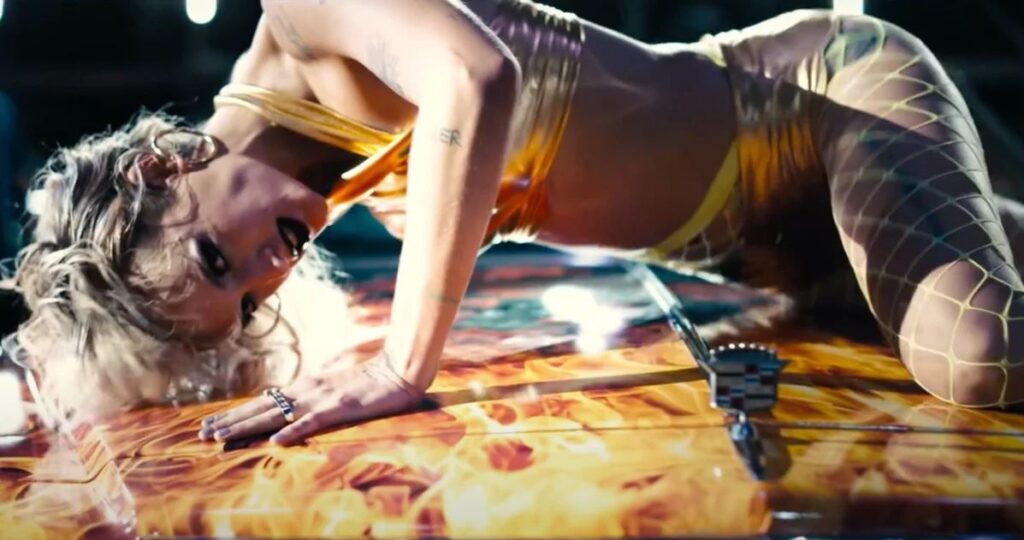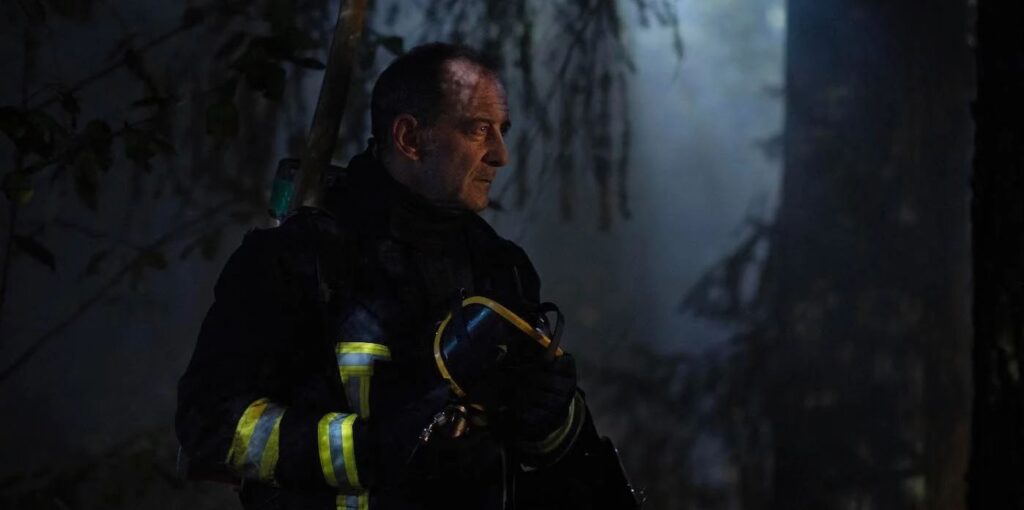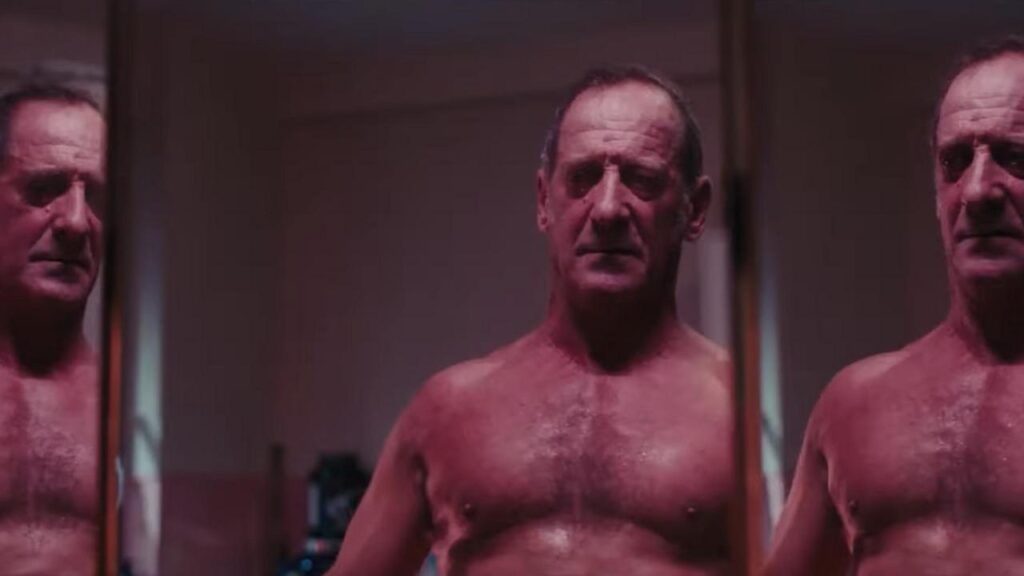
Car trouble gets a remodel in Titane, the blistering new thriller from the French provocateur Julia Ducournau. If you think the dudes from the Fast & Furious flicks are into vehicles, wait until you meet Alexia, a woman with a metal plate wedged into her head and a screw loose in her brain. The plate was installed during her childhood (the screw has presumably been loose since birth), after she inspired a crash by distracting her father while cooing “vroom-vroom” from the backseat; far from holding a grudge, as soon as she’s released from the hospital, she plants an adoring smooch on the sedan’s window. Flash forward 20-odd years, and her affections for automotives have, shall we say, matured, even if her moral compass continues pointing straight toward a black hole.
Ducournau’s first feature was Raw, and if you saw it, you haven’t forgotten it, especially the scene where a hungry teenage girl nibbled on her sister’s severed finger. Her follow-up bears a number of similarities, many of them appellative; Garance Marillier, who previously starred in Raw as that ravenous limb-muncher, returns here in a smaller role again playing someone named Justine, while other key characters are once more called Alexia and Adrien. More substantively, both films interrogate femininity in a masculine world, and the chaos that results when women start pushing past the guardrails that polite society has erected for them.

Which is interesting, and also maybe beside the point. Titane is a rich text, and it deserves further analysis for its commentary on gender, queerness, sex, and violence. Yet homing in on the movie’s themes risks overlooking its more muscular pleasures, like obsessing over the chic upholstery at the expense of the rip-roaring engine. Ducournau has a lot to say, but what’s really impressive is how she says it—with a combination of fluid technique and unapologetic force. Consider an early scene that follows Alexia (Agathe Rousselle) through an underground night club which is essentially a fashion show for cars, with undulating models accentuating each vehicle’s curves. The handheld camerawork is quietly precise, beckoning us into this sordid world, while the thumping music and the cacophony of admiring shouts quickly establish Alexia as something of a celebrity. (After the exhibition, she briskly signs a handful of autographs, like an athlete post-game.) Ducournau’s craft resembles the flames wreathed onto the cold chassis of the gas-guzzler that Alexia proudly straddles; it’s icy and fiery at once.
Alexia, whose chest is emblazoned with a tattoo that reads “Love Is a Dog from Hell”, leans toward the cooler end of that spectrum, at least at first. In fact, there’s no point in hiding it, despite Ducournau’s allergy to exposition: She’s a serial killer. We first glean this during an early scene that finds one of her male fans stalking her through a midnight-black parking lot; he views her as an object of desire to be possessed, but he’s really mincemeat, as he discovers once his head meets the wrong end of the knitting needle that Alexia uses as an elegant hairpin. The flicker of irritation that flashes across her face as she drags his lifeless body into the backseat suggests this isn’t her first kill, an impression that sharpens when she goes on a sudden rampage inside a posh house. That episode, in which she wields a variety of metallic instruments, is both shockingly savage and spasmodically funny. “How many of you are there?” she groans while waylaying a quartet of unfortunate pleasure-seekers. The answer: not as many as there used to be.

There’s an intimacy to Titane’s violence that heightens its visceral impact, a boon to gorehounds that nevertheless risks flattening Alexia as a character. Had Ducournau sought to maintain this level of gripping nastiness for the entire runtime, the movie might have grown unpalatable in its pitiless punishment. Thankfully (and unexpectedly), she soon shifts gears, throttling down from full-tilt extremism to a more restless hum that mingles tension, alienation, and curiosity. Seeking to evade police capture, Alexia disguises herself as “Adrien”, the male child victim of a long-ago kidnapping whose current visage is axiomatically unknown. This transformation—perhaps “transition” would be a more fitting word, seeing as it involves her taping down her breasts and attempting to conceal her burgeoning pregnancy, the source of which becomes its own twisted mystery—puts her on a collision course with Adrien’s father, Vincent (a terrific Vincent Lindon), a steroid-addicted fire chief with bruises on his ass and a hole in his heart.
The peculiar relationship that develops between Vincent and Alexia/Adrien is Titane’s most fascinating plot element, even if it initially scans as absurd. Yet what at first appears to be an incredulous depiction of willful blindness gradually reveals itself as a more nuanced study of confusion, desperation, and longing. It seems odd to say about a film where two of the main characters are a murderer and a four-wheeler—the story here can arguably be reduced to Alan Ruck’s famous rant in Ferris Bueller’s Day Off, “Who do you love, you love a car!”—but at its core, Titane is actually quite sweet.

Which doesn’t mean it works perfectly. In essence, Titane isn’t so much a great movie as a collection of great scenes held together by uncertain narrative tissue. The rivalry that simmers between Adrien and Vincent’s pet pupil (Laïs Salameh) is unpersuasive, while Ducournau’s insistence on twinning the literal with the allegorical (just what exactly is that black fluid leaking from Alexia’s nipples?) can be vague as well as powerful.
But mercy, can she deliver a set piece or five. Ducournau is indiscriminate in her tastes, which is to say she’s equally gifted while operating in any number of modes. She’s alarmingly adept at Cronenbergian body horror; the brutality of the scene where Alexia methodically breaks her own nose is eclipsed only by the excruciating moment where she tries to use that weaponized hairpin to abort her pregnancy. There’s some discomfitingly freaky sex too, in which Ducournau shows Alexia tumbling into a car, then preys on the suggestive power of your imagination. Yet she’s just as capable of conveying music-video jubilation; for all its bloodletting and death, Titane is full of dancing. One of the film’s crucial scenes involves Vincent and Adrien grooving to a Zombies hit (you know the one), while a late sequence in which Adrien slithers and shimmies atop a truck upends the testosterone-laced masculinity of the firehouse, exposing the shame that men feel when confronted with feminine sensuality. And if you think you’ve seen the full breadth of cinematic resuscitation sequences, wait until you watch Vincent instruct Adrien to perform CPR to the beat of the Macarena.

Ducournau’s uncompromising approach requires commensurately committed performances, and she gets one from Rousselle, who never minimizes Alexia’s lethality even as she procures a measure of our sympathy. But it’s Lindon who provides the movie with its shiver of emotional gravity. When we first meet Vincent, he’s a shattered person—even his feverish workout sessions end in shrieks of anguish—and Lindon invisibly articulates the process of a man slowly rebuilding himself, willingly sacrificing his grasp on reality in favor of human connection, however counterfeit.
That Ducournau grants Lindon the breathing space to deliver such a textured portrayal is a testament to her own formidable poise—an inveterate command of light and sound and color that belies her youth. Just two features into an incredibly promising career, she’s already earned must-see status, and I can’t wait to see what demented vision she births next. Who do I love, I love a star.
Grade: B+
Jeremy Beck is the editor-in-chief of MovieManifesto. He watches more movies and television than he probably should.
